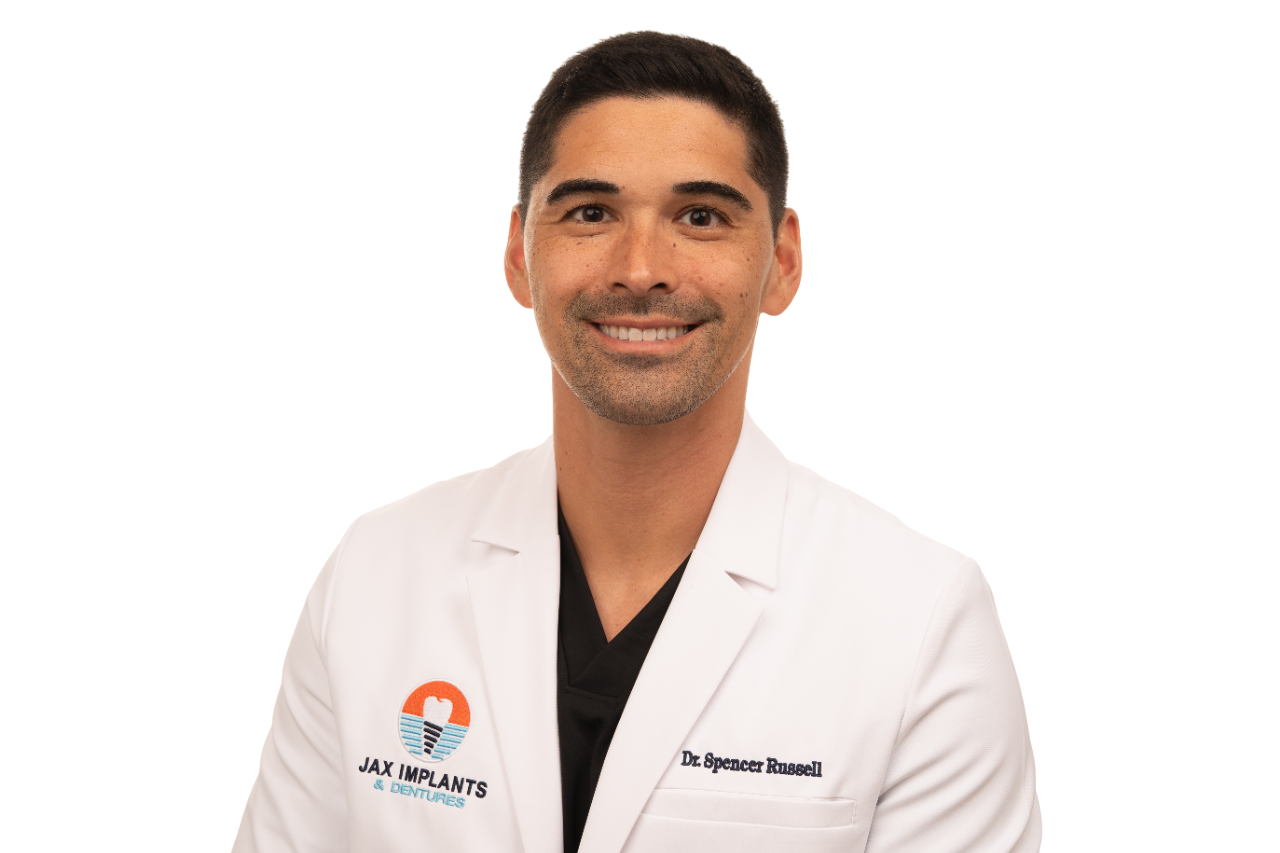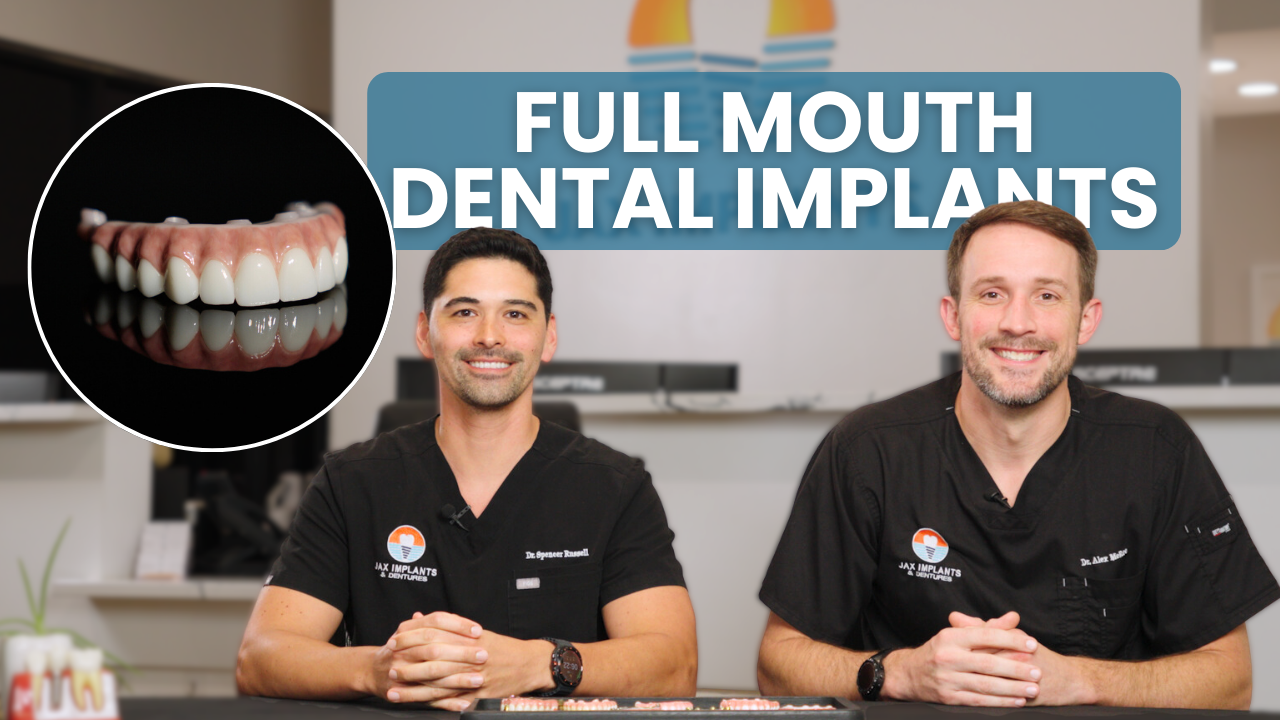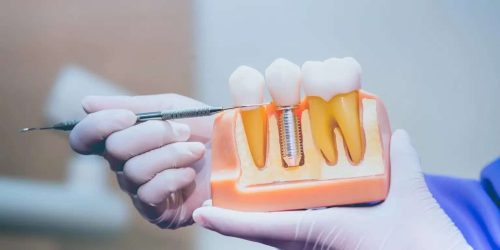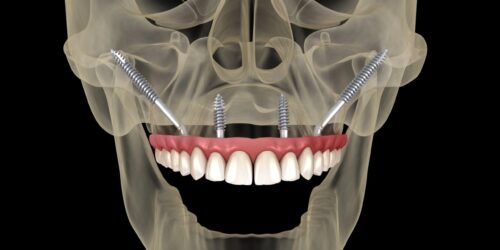When considering full mouth restoration, it’s essential to understand the differences between full mouth dental implants, snap-in dentures, and traditional dentures. In this blog, Dr. Alex McRee and Dr. Spencer Russell from JAX Implants break down each option, discussing functionality, longevity, and patient satisfaction to help you make an informed decision.
Full Mouth Dental Implants: The Best Long-Term Solution
Full mouth dental implants (such as All-on-4 or All-on-X) provide 98% chewing power, meaning you can eat almost anything you want. These implants are permanently fixed, so they don’t move around or require removal like dentures.

“With full mouth implants, you’re getting a permanent, stable solution that doesn’t shift or move around, and you can chew virtually any food with confidence.”
— Dr. Alex McRee DMD
This option is an investment in long-term oral health, comfort, and function, eliminating many of the drawbacks of removable dentures. They also help prevent bone loss, keeping your jaw structure intact over time. With advancements in technology and our in-house lab, we’ve made the process more efficient and streamlined than ever before.
Snap-In Dentures: A Less Popular Option
Snap-in dentures (or implant-retained dentures) were once a common alternative, but they are becoming less popular due to the availability of long-term temporaries at a similar price. While they offer more stability than traditional dentures, they still have significant drawbacks—such as only providing 50% of natural chewing ability.

“That doesn’t mean you can just chew a little longer. It means 50% of the foods you can’t eat. Technically, you can eat them, but it’s not fun.”
— Dr. Alex McRee DMD
Many patients find that over time, the movement and lack of full stability make eating less enjoyable. Additionally, long-term studies show that upper snap-in dentures are not a reliable option.
Why We Don’t Recommend Snap-In Dentures for the Upper Jaw
Many long-term studies are showing that snap-in dentures on the upper jaw don’t last. The reason? The constant removal and reinsertion of the denture causes movement and rocking, putting stress on the implants. The upper jaw also has softer, less dense bone, making it more susceptible to this issue.

“Each implant is like a fence post in the ground. You can go in there and just wiggle that implant individually. Over time, they start to lose bone around them. Five, six, seven, ten years down the road, those implants become loose.”
— Dr. Alex McRee DMD
At that point, patients often find themselves in a difficult situation where bone loss makes implant replacement more complicated. This is why full mouth dental implants are a far better long-term investment.
Traditional Dentures: The Budget-Friendly Alternative
For patients looking for a low-cost option, traditional dentures are available. While they are affordable, they come with significant drawbacks:
- Chewing power is only 10-20% of natural teeth.
- Covers the roof of your mouth, affecting taste and speech.
- Requires removal and cleaning, which some patients find inconvenient.
- Bone loss over time may require adjustments, relines, or even replacements.

“A huge complaint we hear from people in upper dentures is, ‘I just can’t taste my food. It all tastes bland now.”
— Dr. Spencer Russell DMD
Making the Right Choice for Your Smile
At JAX Implants, we believe in educating our patients to make the best decision for their long-term health and happiness. If you’re considering full mouth restoration, we highly recommend full mouth dental implants for maximum stability, function, and longevity.
Want to hear the full discussion? Watch the complete video to get all the expert insights from Dr. Alex McRee and Dr. Spencer Russell.
Schedule Your Consultation Today!
If you’re ready to explore your options, schedule your complimentary consultation with our team at JAX Implants. We’ll help you find the best solution for a confident, functional smile to last a lifetime!





